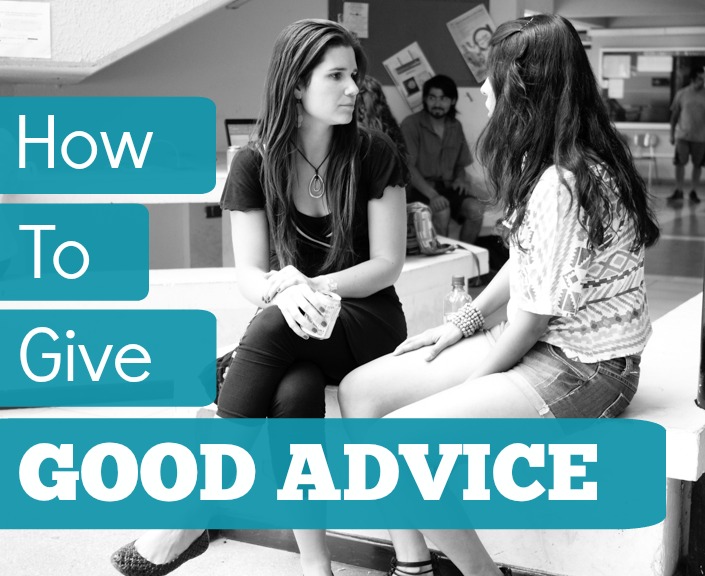While I know that what makes advice ‘good’ can be highly subjective and has so many variables, I thought today I’d share with you some of my tips for giving golden advice, every time.
Detach yourself from the outcome.
This is the hardest and the most important. And to be honest with you, I’m not great at this yet — I still have moments when I can see what someone is doing and how it’s just wrong and I’m right and if they just did what I said THEIR LIFE WOULD BE BRILLIANT, OK?! (oops, deep breaths…)
But that’s not the point. If you’re giving advice to your friend, you are aiming to simply give them another perspective. You can’t make them do something they’re not ready for yet and you can’t get mad at them if they don’t follow your advice. Hopefully something will bubble away in their subconscious and they’ll come around in time.
Listen.
Yes I know, der. But so often when we’re listening to someone speak we’re already thinking about what we’ll say next. Stop that. Just really listen. And watch. Listen to their words, watch them as they speak — this will give you some clues about how they feel about what they’re saying (and maybe show you that they’re not telling you everything, or that they don’t really mean what they say). It might also help you to see when they’re getting defensive or uncomfortable, and you need to ease up on them a bit.
It’s not about you.
You know how when someone tells you about that time that they were nearly in a car accident and your first instinct is to say, ‘Yes that happened to me too! *Blah blah story*’ We do this to form a connection, to show them we understand what they’re saying or how they feel.
When you’re in advice mode, though, it’s best to use your anecdotes sparingly. You don’t want to sound like you’re lecturing or being bossy (or making it about yourself). Instead, make sure your story is super-relevant, and be clear that you’re offering it as food for thought only: ‘I know when I was having trouble in my relationship, I tried…(short, relevant anecdote) and it helped us. Maybe you and Steve could try that?’ This isn’t an opportunity for you to unload about ALLLLLLLL the annoying things your ex-boyfriend did while you were together. That’s for a ‘let’s all get drunk and bitch’ night, not an ‘I need your help’ dinner.
Think about them.
Seems obvious, I know. But you’d be surprised. Following on from the above point, this is about acknowledging that what might work for you may not necessarily suit your friend. Maybe you’re really outspoken and have no trouble telling people what you need from them. But your friend may be very shy, so saying to her “Well why don’t you just have a meeting with your boss and tell him you deserve a pay rise because of x, y and z?” is not really useful advice, because it’s way outside of her comfort zone. Consider everything that applies to her situation, and advise from there.
Make it a conversation.
This isn’t an opportunity for you to sermonize. Offer up your wisdom, and be open to theirs as well. You know how sometimes you only find a solution after you’ve talked around a problem for awhile? This is the same. Bounce ideas off one another and work towards a solution. If your friend is feeling uncertain you can lead the conversation, but make sure you don’t dominate it.
Wait to be asked.
Okay, this one is totally optional! (And I’m guilty of ignoring it, more often than not). As a fixer, if you tell me you’re having a problem I want to find a solution. But it’s important to recognise that we humans love to just blow off steam, as well. Is your friend asking for help, or just having a rant?
Next time your friend asks you for help (or she doesn’t, but she needs it), keep these tips in mind and work from there. Ultimately, if you are coming from a supportive and non-judgemental place, you’re already winning!
What do you consider before giving advice? Share in the comments below.



Awesome post Tahlia. Spot on advice, I’m probably guilty of breaking several of these sometimes. 🙂
Thanks Eve! I think we all are 😉